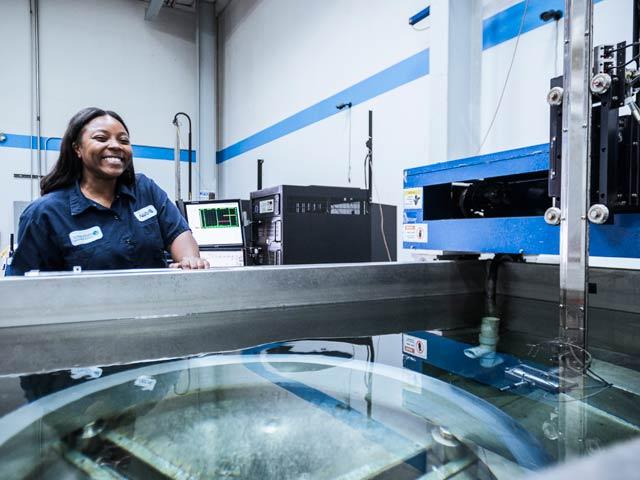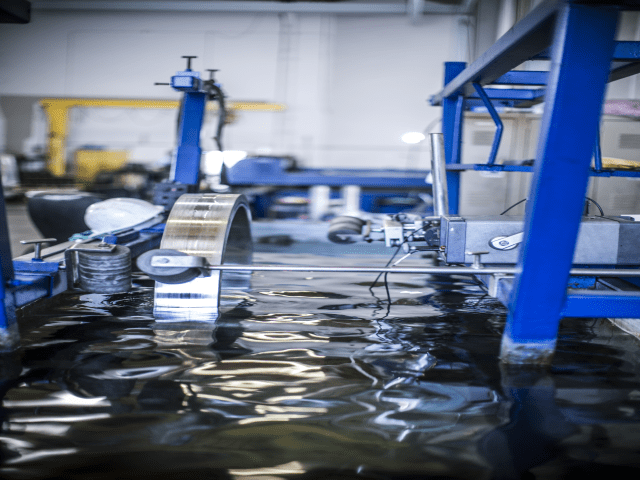Element offers advanced Immersion Ultrasonic Testing specifically for pipeline girth welds in the Oil & Gas Industry.
Operators and pipeline contractors need absolute confidence in the accuracy and reliability of Automated Ultrasonic Testing (AUT). To ensure the future integrity of welds in oil and gas pipelines, Element offers advanced Immersion Ultrasonic Testing (IUT) for the validation of the Probability of Detection to minimize the risk of substantial repair and recovery costs. Our IUT services can help you to identify:- Cracking
- Inclusions
- Incomplete penetration
- Lack of sidewall fusion
- Porosity
- Other weld strength defects
Our experts assist you in producing girth welds, using a standardized procedure for AUT validation applied globally across our network of laboratories.
IUT evaluation for the Oil & Gas industry is described in the DNVGL-ST-F101 and DNVGL-RP-F118 standards. Applying the standard results in executing a double-sided scan including a critical evaluation of the data and the indications identified. Depending on the base and welding material, bevel design and application of CRAs, different material preparation and analysis principles are applied.
The IUT process
As there are numerous possibilities for applying IUT for girth weld inspection, Element has developed a flexible procedure:
- Requirement assessment
- Procedure development
- Production of dedicated calibration block, including sensitivity and calibration Flat Bottom Holes
- Pre-scanning of the material for method optimization (when required)
- Scanning and reporting in accordance with the procedure
The IUT technique enhances the evaluation of the Probability of Detection (PoD) provided by AUT. Deliberately flawed seeded test welds are first examined by the AUT system under qualification, they are then inspected by IUT prior to physical sectioning for definitive confirmation of the size of the known flaws. The testing service is particularly relevant in identifying smaller defects and in clarifying clean areas because of the high accuracy robotics and controlled immersive testing environment.
The Element advantage
This unique service from Element ultimately brings a range of benefits that allow pipeline contractors to achieve their goals with minimum economic output and maximum efficiency. With our advanced technology supports processes such as weld testing and welding certification, metallurgical testing, failure analysis, corrosion testing, fatigue testing and consultation.
For more information about our Immersion Ultrasonic Testing services or to request a quote, contact us today.
The Benefits of Immersion Ultrasonic Inspection of Composites
Read the article to explore the benefits of two methods of ultrasonic inspection of composites: contact and immersion ultrasonic testing (IUT).
Read MOREWhite Paper: Ultrasonic Phased Array Testing
Ultrasonic testing (UT) is a non-destructive test method that utilizes sound waves to detect cracks and defects in parts and materials. This white paper provides an overview of the inspection method and the benefits toward material approval.
Read MOREKeeping People, the Environment, and Assets Safe with Non-Destructive Testing
Non-destructive testing (NDT) is critical to ensure the infrastructure and assets that we use daily remain safe, learn more about the benefits of weld testing. Read MoreMore from Element

Oil & Gas
Element's global platform of laboratories offers advanced services designed to test and qualify materials intended for use within the environments of the future.

Ultrasonic Inspection and Testing
Element maintains full-service ultrasonic laboratories to offer in-house, onsite, and field inspections and certifications.

Corrosion Under Insulation (CUI) Testing
Element supports clients to assist in evaluating solutions to try and mitigate corrosion under insulation (CUI).

Coatings Testing
Find out about Elements range of coatings testing services designed to help to make certain that materials, products and pipelines we test for our customers are protected from corrosion, ultraviolet light, water penetration, heat, abrasion and chemicals.


